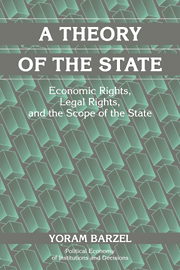Book contents
- Frontmatter
- Contents
- Preface
- 1 Introduction
- I The Emergence of Protection and Third-Party Enforcement
- II The Emergence of Legal Institutions
- 9 Legal Rights
- 10 The State's Enhancement of Market Trade
- 11 The Size and Scope of the State
- III The Character of the State
- References
- Index
- Other Books in the Series
9 - Legal Rights
Published online by Cambridge University Press: 04 December 2009
- Frontmatter
- Contents
- Preface
- 1 Introduction
- I The Emergence of Protection and Third-Party Enforcement
- II The Emergence of Legal Institutions
- 9 Legal Rights
- 10 The State's Enhancement of Market Trade
- 11 The Size and Scope of the State
- III The Character of the State
- References
- Index
- Other Books in the Series
Summary
In Part I of this book we developed a framework to study the nature of the state. Part II focuses on legal institutions and puts more flesh on the previously described bones of the state. In this chapter, I discuss the relationship between protection and delineation and how the formation of that relationship amounts to the founding of legal institutions. Protection efforts vary in terms of the assets in need of protection and the types of threats made against them. I demonstrate that legal institutions will vary with the threats and the asset types. In order to proceed, legal rights must be defined.
Definition. Legal rightsare the claims over assets delineated by the state as the property of particular individuals or institutions.
The “assets” in the definition are all-inclusive. They encompass, among other things, physical assets, as well as individuals (owned by themselves or, in the case of slaves, by others), intellectual creations, brand names, and reputations. The enforcement and protection measures that the state provides include the prevention of any kind of uncompensated use of or damage to one's legal assets by other persons. Such enforcement covers, for instance, damage from rape and from copyright infringement. I argue later that the state's delineation of assets can take two distinct forms. In one, the state explicitly agrees to protect certain assets. In the other, the state agrees to protect any assets that individuals register with it, as well as those that individuals delineate in contracts.
Besides the violence-using enforcer, other third parties can delineate and enforce claims over assets. The rest of this chapter is devoted primarily to the topic of protection and delineation by force-using protectors, touching only briefly on delineation by other third parties.
- Type
- Chapter
- Information
- A Theory of the StateEconomic Rights, Legal Rights, and the Scope of the State, pp. 157 - 184Publisher: Cambridge University PressPrint publication year: 2001



